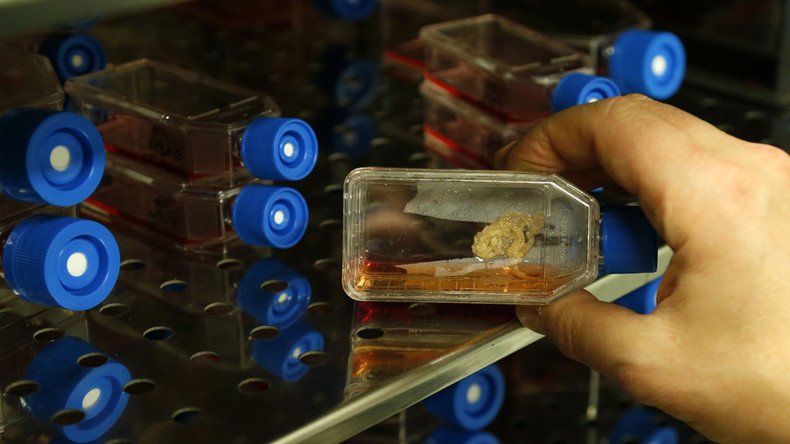At least 570 stem cell clinics operate unregulated by FDA — study

Businesses marketing stem cell therapy are flourishing in the US, where there is no federal approval or regulation for the procedures. A new study finds the controversial services are being offered at approximately 570 clinics.
For years, Americans have listened to the debate over stem cell research, which prominently featured scientists describing its potential benefits. However, only a few stem cell treatments have been approved by the US Food and Drug Administration (FDA) – despite the abundance of conditions various unregulated stem cell clinics claim to treat.
Stem cells are a unique part of the human body, because, unlike other cells, they can mature and develop into cells for many different kinds of body tissue. This is a part of the selling point behind unregulated stem cell therapy.
Coaxing stem cells into different cells has been cited as a potential treatment for arthritis, autism, erectile dysfunction, diabetes, heart disease, lupus, hair loss, Crohn’s disease, hormonal imbalances, muscle strains and butt augmentation – just to name a few advertised by businesses discovered by the study.
While some stem-cell treatments have been approved, the Washington Post found that the majority of the 570 businesses uncovered by the study were conducting treatments that were not approved and are outside clinical trials.
Implant for opioid addicts gets thumbs up from FDA advisers https://t.co/iwSi0ClA0spic.twitter.com/hHBQawCd6G
— RT America (@RT_America) January 15, 2016
Michael Werner, executive director of the Alliance for Regenerative Medicine, defended the need for FDA oversight of these clinics, telling the Post, "the proliferation of the so-called stem-cell clinics is potentially harmful because the treatments may not undergo, or have not undergone, the appropriate scientific rigor that takes place in evaluating new technologies and new medical treatments."
While stem cells can form most other kinds of tissue, that does not mean they only have positive results. Stem cells can rebel and migrate to other parts of the body where they do not belong or form tumors.
With these questionable and often times expensive treatments being unapproved and unregulated by the FDA, many wonder how these clinics are allowed to operate.
"I ask myself that question all the time," Leigh Turner, a bioethicist who worked on the study, said to CBS News.
Turner explained that websites for these businesses can offer links to published medical studies that make their therapies seem legitimate, despite the scientific research occurring outside of the places that offer stem cell treatment, such as Beverly Hills spas.
"These businesses can be quite savvy," Turner said. "I think it's asking too much to just tell consumers to be wary. We need to be asking, why should these clinics be allowed to do this?"
New stem cell may eventually generate human organs in animals, save millions of lives http://t.co/5TKFSKULzxpic.twitter.com/3F9nGSIVR0
— RT America (@RT_America) May 8, 2015
Arthur Caplan, a bioethicist who directs the medical ethics at NYU Langone Medical Center, told CBS News that as long as the businesses do not engage in interstate commerce, they can happily fly under the radar.
Furthermore, the process that many of these clinics use creates a regulatory gray area. While injecting someone with stem cells harvested from another person could avoid some legal red flags, stem cell therapy is often autologous, meaning that the stem cells are from the same individual’s body fat or bone marrow.
The debate over regulating the practice has gone beyond just being a medical debate. Some Republicans in Congress are trying to approve a bill that would grant the FDA permission to approve stem cell treatments for five years, without going to advanced clinical trials.
The risks of stem cell therapy go beyond snake oil salesman tactics. In 2010, a 69-year-old woman suffered a stroke after her bone marrow was “grossly filtered” for stem cell therapy, the Naples Daily News reported. She was hospitalized and eventually taken off of life support.
Zannos Grekos is the former doctor who performed the treatment on her. In 2012, he attempted the same procedure on a 77-year-old man from Indiana who also died as a result. The Florida Board of Medicine revoked his license in 2013.
"These clinics are preying on vulnerable people," Caplan, the NYU bioethicist, told CBS News.
The FDA has issued draft guidelines on the use of stem cells and is planning a public hearing in September.
Virus as medicine: Genetically engineered virus can cure cancer, scientist learn http://t.co/Ov09Ge2bEfpic.twitter.com/lgJSEOMevz
— RT America (@RT_America) May 28, 2015












